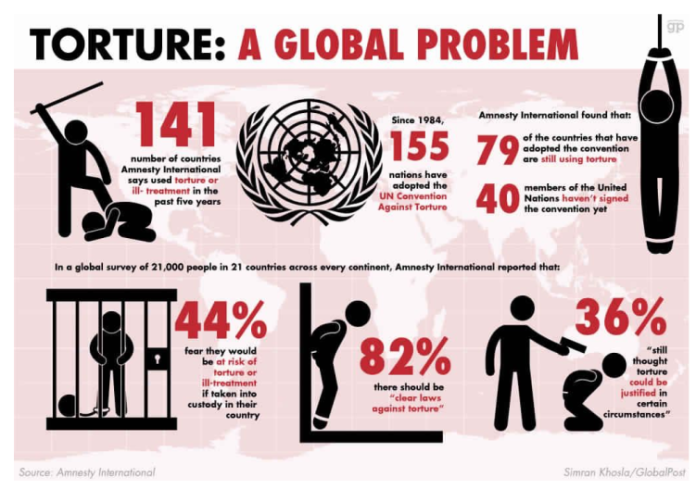New Delhi— In a scathing report released on Thursday, the Global Torture Index has ranked India as a “High Risk” nation for torture and ill-treatment, citing rampant custodial violence, systemic police brutality, and institutional discrimination, especially targeting marginalised communities, including Muslims, Dalits, Adivasis, and human rights defenders.
Prepared by the World Organisation Against Torture (OMCT) in collaboration with national bodies such as People’s Watch, the Index assesses torture risks in over 140 countries based on seven core pillars, including political will, ending police brutality, institutional safeguards, and access to justice.
The report exposes routine abuse of power by Indian police and security agencies, citing practices such as forced confessions, physical torture, extrajudicial killings, and the use of unofficial detention centres. The misuse of draconian laws like the Unlawful Activities (Prevention) Act (UAPA) by agencies like the NIA and CBI has disproportionately affected India’s religious and ethnic minorities—especially Muslims, who continue to face systemic harassment, surveillance, and wrongful imprisonment.
In 2024 alone, 2,739 custodial deaths were recorded by the National Human Rights Commission (NHRC), a sharp increase from approximately 2,400 in 2023. These figures include many from marginalised backgrounds who died under suspicious circumstances—during transfers, in lock-ups, or in hospitals—after alleged physical beatings and coercive interrogations.
The Index draws attention to the arbitrary detention of human rights defenders and journalists under anti-terror laws. Among the cases highlighted are those of Professor G.N. Saibaba, who died in custody despite being 90% disabled; journalist Siddique Kappan, jailed for two years for reporting on caste violence; and Kashmiri activist Khurram Parvez, who remains incarcerated without trial.
The Bhima Koregaon case, involving prolonged imprisonment of lawyers, activists, and academics—most of them vocal against Hindutva politics—is cited as an example of India’s crackdown on dissent. The report also warns of rising torture cases in border areas of West Bengal, where BSF impunity has allegedly led to widespread abuse.
Criticising India’s recent criminal law overhaul, the report notes that new codes such as the Bharatiya Nyaya Sanhita (BNS) and Bharatiya Nagarik Suraksha Sanhita (BNSS) fail to strengthen protections against torture and may instead reinforce institutional violence.
Despite a 2020 Supreme Court mandate to install CCTV cameras in all police stations to prevent torture, compliance remains dangerously low. Over 2,700 stations reportedly lack CCTV coverage, and most existing systems do not meet court-mandated standards.
The report accuses the NHRC of lacking independence and effectiveness, especially in dealing with abuse by armed forces and police. GANHRI, the global human rights network, recommended downgrading NHRC’s accreditation from ‘A’ to ‘B’ earlier this year, citing accountability gaps, conflicts of interest, and a failure to protect civic freedoms.
Also flagged was India’s chronic prison overcrowding, with jails operating at 131.4% capacity, leading to degrading conditions and affecting poor and minority inmates the most. The case of Professor B.N. Saibaba, imprisoned under UAPA despite severe disabilities and denied medical care, is used to illustrate this grim reality.
Importantly, the report notes that India has not ratified the UN Convention Against Torture (UNCAT) or its optional protocols, despite repeated recommendations. It also accuses India of blocking visits by international human rights monitors, including the UN Special Rapporteur on Torture.
Further, the report exposes the shrinking civic space in India, highlighting that over 30,000 NGOs have been rendered inoperative since 2020 due to arbitrary enforcement of the Foreign Contribution (Regulation) Act (FCRA). Many organisations working with minorities, especially Muslims and Dalits, have faced targeted crackdowns.
The Index calls on India to:
1. Ratify the UNCAT and its protocols.
2. Implement independent judicial investigations into all custodial deaths.
3. Stop the misuse of UAPA and preventive detention laws.
4. Adopt the Méndez Principles for effective, humane policing.
5. Amend the Protection of Human Rights Act to ensure NHRC’s autonomy and credibility.
At the Geneva launch event, Henri Tiphagne, Executive Director of People’s Watch, condemned India’s custodial torture record and called the lack of accountability a “national shame,” noting that not a single police officer has been held accountable despite numerous human rights institutions in the country.
The Global Torture Index classifies India alongside several Asian and African countries under the “High Risk” category, below only the “Very High Risk” nations such as Russia, China, and conflict-ridden regions in the Middle East. In contrast, most countries in Europe and North America are deemed “Low Risk” due to stronger democratic safeguards and legal mechanisms.
India’s current trajectory, the report concludes, reflects a dangerous normalisation of state violence, institutional silence, and growing disregard for the rights of minorities and the marginalised—with Muslims, in particular, bearing the brunt of an increasingly repressive system.




